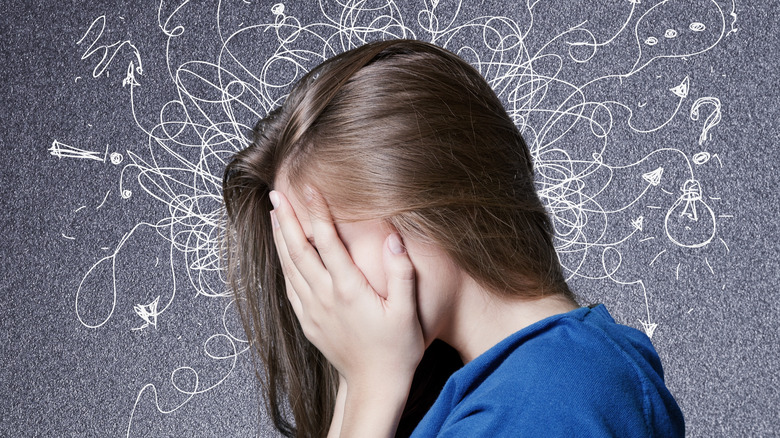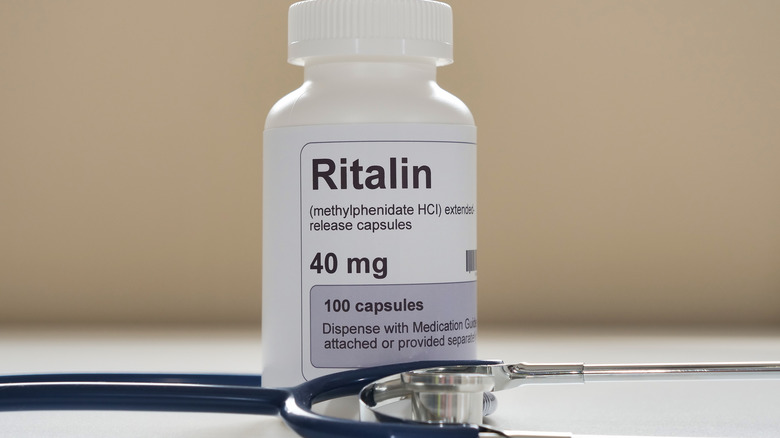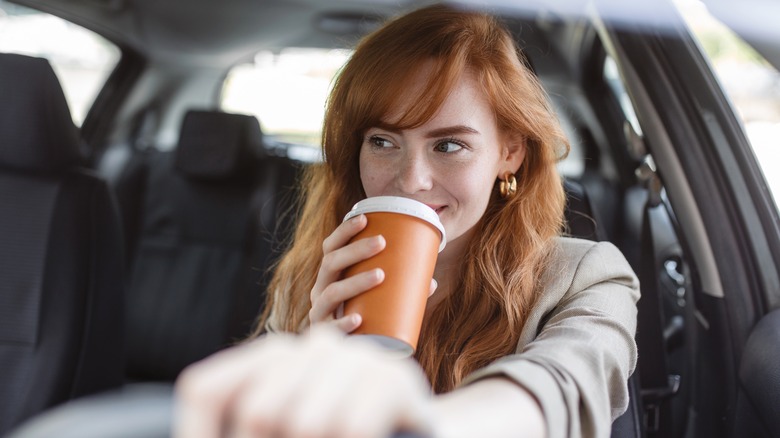Is It Safe To Drink Coffee While Taking Ritalin?
Coffee is a drink beloved and enjoyed by many daily around the world. It's a traditional yet highly customizable morning staple used to boost energy. Is there a link between this delicious drink and medication for a neurodevelopmental disorder?
According to the Centers for Disease Control and Prevention, neurodevelopmental disorders involve how the brain grows and develops. Attention-deficit/hyperactivity disorder, or ADHD, falls under this category of conditions. Research shows that there are links between ADHD and genetics. However, other possible risk factors include low birth weight, premature birth, brain injury, early exposure to environmental risks, and alcohol or tobacco use by the mother during pregnancy.
ADHD is usually diagnosed in childhood and continues into adulthood (per the CDC). Those with the disorder experience various symptoms, such as fidgeting, trouble taking turns, talking too much, frequent daydreaming, forgetfulness, and trouble getting along with others. These symptoms cause trouble with paying attention and behaving, which can cause issues with school and relationships. Therapy is often used to manage these symptoms, along with medication.
Ritalin is the brand name for methylphenidate, one of the major types of medication used in treating ADHD (via Medline). This medication is taken at least once daily by mouth and can begin working quickly. There are variations such as long-acting chewable tablets, capsules, or solutions that help to slowly release the medication over a longer period during the day. But since Ritalin is a stimulant, how does this medication interact with other stimulants like coffee?
How stimulants can help
Methylphenidate is a stimulant that can increase your ability to pay attention, control behavior, and help you focus on what you're doing by changing the amount of certain substances in the brain, reports WebMD. It can cause side effects such as trouble sleeping, dizziness, headache, and weight loss, but it is prescribed regardless due to its ability to benefit the patient.
Caffeine is regularly consumed in items such as chocolate, coffee, and tea, but it, too, is a stimulant (per WebMD). In fact, caffeine is the most widely used stimulant in the world. This is perhaps because the food items mentioned previously aren't regulated or treated as a medical prescription. As a stimulant, caffeine also can increase substances in the brain, such as dopamine, that send signals regarding attention, movement, and pleasure. By increasing these, caffeine can increase concentration and alertness. Caffeine has its own side effects, such as insomnia, upset stomach, irritability, and headaches.
According to WebMD, there is some potential for caffeine to be used for ADHD because of its stimulant qualities. Since Ritalin is prescribed and caffeine is unregulated and widely used, the chances of them interacting in ADHD patients are high. With coffee being a caffeinated beverage, what happens when it is mixed with Ritalin?
Combining caffeine and Ritalin
Research shows that caffeine is much less effective than Ritalin and Dexedrine, another prescribed medication used to treat ADHD (per WebMD). A 1981 study published in The Canadian Journal of Psychiatry used different stimulants to treat children with ADHD. The results concluded that low doses of caffeine used along with Ritalin resulted in the best results of all the stimulants tried. High doses of caffeine did not have the same effect and worked no better than a placebo.
Caffeine is not recommended as a treatment for children as it can affect their brain development, and side effects may be more severe. However, this combination seems promising for adults based on the study and potential of Ritalin and caffeine in treating ADHD. The U.S. Food & Drug Administration reports that a single 8 oz cup of coffee has 80 to 100 milligrams of caffeine, and that up to 400 milligrams of caffeine are associated with a lack of dangerous negative effects.
You could interpret this to mean 80 milligrams or one cup is on the low end, and 400 milligrams is the high end of the average acceptable daily caffeine intake. Those prescribed Ritalin should remember this before reaching for a second cup of coffee. While it seems safe (as Mayo Clinic does not list caffeine as having a possible interaction with Ritalin) it is best to notify your doctor regarding your coffee intake before combining these stimulants.



